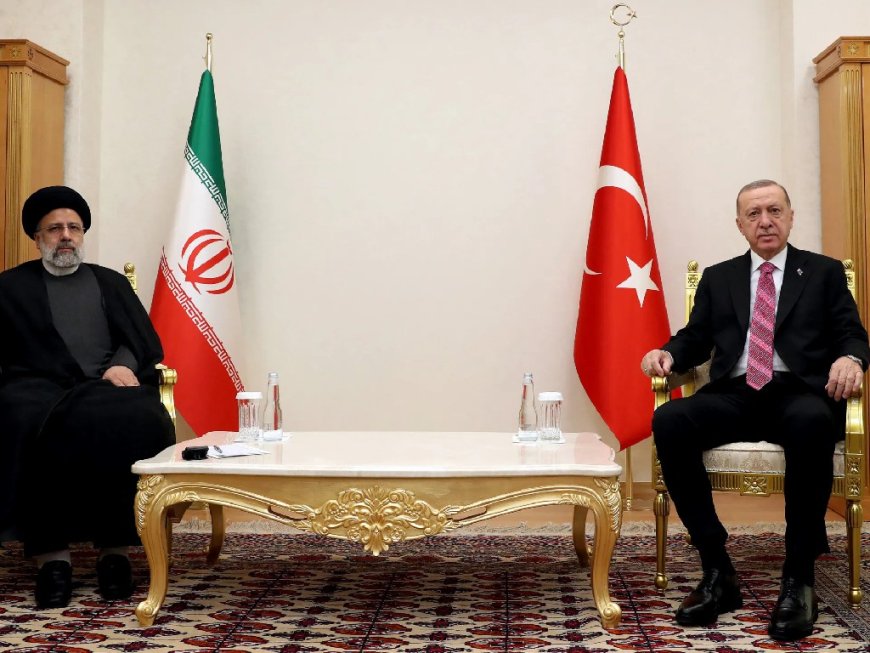Iran -Turkey... agreements threatened by contradictions of ideological nature
Two researchers considered that there is a disagreement between Iran and Turkey regarding imposing control and hegemony over the region, and pointed out that despite some agreement between them on several files, there are disagreements on other files, including those of an ideological nature.

On the 24th of this month, Iranian President Ebrahim Raisi made his first visit to Turkey, after postponing it twice, as the two countries find it difficult to harmonize their interests in many of the countries in which the two parties interfere, at a moment of great and unprecedented turmoil that the entire Middle East is witnessing.

In this context, the researcher specializing in Turkish affairs, Karam Saeed, considered that the visit of Iranian President Ibrahim Raisi to Turkey: “comes within different contexts, linked to the Iranian-Turkish consensus regarding the management of the war in Gaza, as well as in the context of the two countries’ keenness to enhance joint cooperation in many areas.” Issues, most notably energy projects.”
The researcher explained that Turkey: “represents an economic core for Iran, in light of the continued sanctions imposed on the latter, and Turkey now needs to strengthen the relationship in energy and gas projects with Iran, especially after Western sanctions on Moscow and the attempt of Western powers to target the Russian energy sector.” He pointed out It has become known that "Turkey is mainly interested in meeting its needs for energy resources from Russia and then from Iran."
Karam Saeed added: "This visit comes in the context of an attempt to strengthen trade relations between the two countries, and Iran's attempts to improve its regional relationship after agreeing with Saudi Arabia and trying to calm tensions with the Gulf states."
Karam Saeed said: “There are controversial issues that represent major challenges to moving Turkish-Iranian relations forward, and on top of these challenges is the Turkish-Iranian dispute regarding the Syrian scene and the two countries’ siding with different parties in the Syrian crisis, not to mention no less serious disputes in Central Asia
Karam Saeed added: "This visit comes in the context of an attempt to strengthen trade relations between the two countries, and Iran's attempts to improve its regional relationship after agreeing with Saudi Arabia and trying to calm tensions with the Gulf states."
The writer ruled out that there would be differences between Turkey and Iran regarding targeting the Kurds in Syria and Iraq. According to the researcher, the Kurdish file represents a priority for the two countries, but more for Turkey. There are also deep differences regarding the settlement of the crisis in Syria. He explained that Turkey: “is convinced of the necessity of the parties’ participation.” The local government is loyal to it in any future political entitlement, while Iran is keen to keep Assad, considering that he guarantees its interests.
The researcher on Turkish affairs considered that an essential part of the Turkish movements in North and East Syria in Southern Kurdistan is “linked to confronting the Kurds.”
As for Iranian moves in northwest Syria, the researcher indicated that they are linked to Iran’s keenness to manage the strategic balances inside Syria: “It is true that there is a Russian-Iranian agreement to support Bashar al-Assad, but there are differences between them, as the two countries seek, individually, to secure their influence is at the expense of the other party in Syria.”

The researcher on Iranian-Turkish affairs, Hani Suleiman, considered that Raisi’s visit to Turkey: “comes in light of major international changes affecting the two countries, and the existence of a horizon for some files that have a qualitative and common rapprochement, including the issue of the war in Gaza, and the joint diplomatic coordination between this file and the similar position of the two countries on... Supporting Hamas.
He believed that: “Iranian-Turkish relations can be described as strong economically and characterized by political instability and tension, although there are several different files that are subject to tension between the two parties, including the Kurdish file and the two countries’ different positions on what is happening between Armenia and Azerbaijan, as well as Iranian accusations that Turkey supports the Azerbaijani minority.” In Iran, which constitutes a threat to Iran, which Iran considers a threat to its national security.”
The other file, according to Suleiman, is the classic disputes inside Syria, where: “The Turkish side supports armed groups with Islamic tendencies, while Iran supports the Syrian regime along with Russia, and thus a number of diplomatic and political disputes and conflicts of interests.”
Hani Suleiman, a researcher on Iranian and Turkish affairs, pointed out that the differences between the two countries in Syria and Iraq “stem from the fact that Iran is an ideological state, and Turkey has persistent attempts to revive the glories of the Ottoman Empire, and it is not devoid of an ideological dimension.”
T/ Satt.
ANHA














